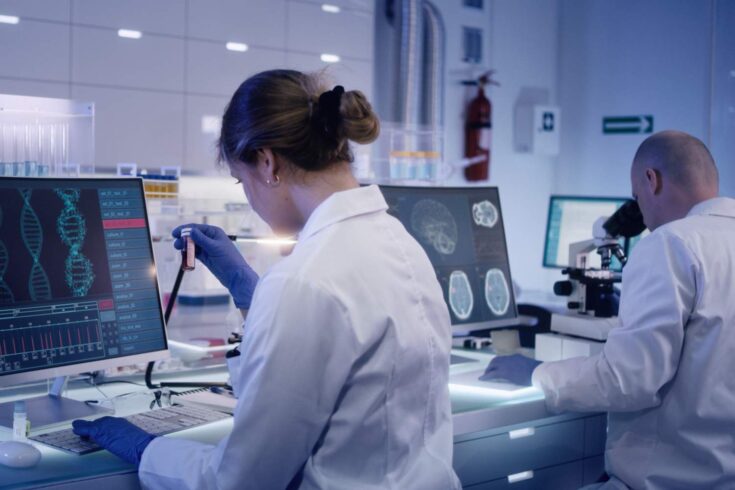GlaxoSmithKline (GSK)
Pharmaceutical firms spend years conducting research only to see most of their potential remedies fail before they ever reach patients.
GlaxoSmithKline (GSK) has been at the forefront of embracing new technologies and has invested significantly in genetics and genomics collaborations, including:
- 23andMe
- FinnGenn
- UKBiobank
- Open Targets.
There are also other digitised health data that have emerged in recent years that can speed up and improve drug discovery. At the heart of these efforts is the use of artificial intelligence (AI) and machine learning (ML) to analyse vast sets of biological and genetic data.
Transforming drug discovery
Alongside AI and ML’s potential to transform drug discovery and clinical practice, there are new ethical and societal issues that relate to the datasets and algorithms used.
They range from safety implications to emerging regulatory discussions and new guidance. It is important that these topics are addressed to develop ethical and safe AI products. By doing this, it helps to shape the wider global conversation on responsible AI in healthcare.
The responsible application of AI in drug discovery and clinical practice is a newly emerging field that poses unique challenges. It requires original research to find novel ethical, policy and technical solutions.
International collaboration
GSK.ai is a global network of researchers centred around AI hubs in London and San Francisco, where experts from various quantitative fields consider problems from different perspectives.
The team consists of a diverse mix of:
- scientists
- software engineers
- clinicians
- ML researchers.
They carry out their own research, develop ML algorithms and AI products.
They collaborate with an interdisciplinary team of experts from top ML researchers at Cambridge and Oxford to Silicon Valley software engineers.
What ML can do, over the past two or three years, is deconstruct these massive datasets and elucidate the relationships the various genes have with each other.
Tailored treatments
ML could help with drug discovery in countless ways. Among them are adaptive clinical trials in which ML assists in the identification, approval and distribution of treatments and vaccines.
It could also help develop individualised treatments. It nudges the pharmaceutical industry away from a “one drug for everyone” approach and towards treatment based on an understanding of which drugs will work for whom.
Engineering and Physical Sciences Research Council (EPSRC) has contributed to the two major AI or ML initiatives through the Prosperity Partnership (PP) scheme. GSK supports the initiatives to change the culture of the scientific workforce in the company and in our academia collaborators.
EPSRC Prosperity Partnership project
An EPSRC Prosperity Partnership project between the Universities of Nottingham and Strathclyde, and GSK will accelerate research into:
- the discovery of new medicines
- the development of new synthetic pathways that are greener processes than those existing today.
We are attempting to change the culture such that medicinal chemists engage with in silico experts. They can mine existing publications and data to design better and greener chemical reactions. This has forged new relationships between medicinal chemists and those in ICT departments.
We have made some progress and have identified and modelled chemical reactions based on existing published data.
The use of in silico methods have obviated the use of harmful organic solvents whilst increasing the overall yield of a chemical reaction. This activity, unlike some of the bench science, was not hampered by the coronavirus (COVID-19) lockdowns.
EPSRC Prosperity Partnership with the Crick Institute
Our second EPSRC Prosperity Partnership is with the Crick Institute.
We are adopting a systems approach to developing libraries of specific alkylating agents to systematically take out specific proteins, using reactive fragment screening. This is to determine their role in certain physiological or disease mechanisms.
The development of these probes is guided by the development of AI or ML models. This allows us to improve the overall proteome coverage.
This approach involves:
- high-end mass spectrometry
- chemo-proteomic profiling
- high throughput phenotypic screening
Ways the AI and ML methods are being developed
The AI and ML methods are being developed in a number of ways to:
- predict affinity between a protein and a fragment
- deconvolute libraries
- confirm target-phenotype relationships.
We are also looking at the potential of AI or ML to improve manufacturing processes and have had some success with this challenge.
Skill base for AI and ML
Artificial intelligence is a rapidly evolving field.
Recruitment can be a challenge to ensure there are enough high-quality staff in data analytics, and AI and ML in the UK to advance technologies.
The recent ABPI skills report highlighted the user pull for people with these skills.
Developing cohort across the student base is not enough
We have an active PhD programme. We also had a two-day symposium in December 2021 that allowed our students from Warwick, Cambridge, KCL and Perth to present and share best practice.
We were keen and successful in developing a cohort across the student base. This is a start but, in my opinion, is not enough.
Some of our studentships in the AI or ML space are co-funded by the University, the local Biomedical Research Centre (BRC) or we have fully funded the studentship.
There is opportunity to explore further co-funded studentships in the AI or ML space.



